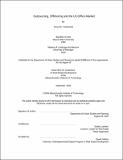Outsourcing, offshoring and the US office market
Author(s)
Topolewski, Tanya M., 1969-
DownloadFull printable version (222.1Kb)
Alternative title
Outsourcing, offshoring and the United States office market
Other Contributors
Massachusetts Institute of Technology. Dept. of Urban Studies and Planning.
Advisor
Sandra Lambert.
Terms of use
Metadata
Show full item recordAbstract
There is intense debate among industry analysts and scholars over potential job losses caused by offshoring. The real estate industry has been grappling to understanding the implications of these numbers, as some have speculated that the projected job losses seem to translate into significantly lower demand for US office space. Professional service firms are major users of office space and these firms are increasingly dependent on IT in nearly every aspect of their business. Due to its technical nature and expense, these industries routinely outsource and/or offshore both major categories of IT work: application services (AO) and business process (BPO). To explore how IT outsourcing and offshoring is affecting the US office market, this work examined three professional services industries: high-tech manufacturing/service and financial services, aggressive adopters of IT, and legal services, a non-aggressive adopter of IT. Through a review of relevant research and structured interviews with eighteen companies, this thesis examined IT outsourcing and offshoring activities with respect to three areas: labor force access, company portfolios and workspace utilization/design. Industry analysts observe that most firms do not yet have global outsourcing strategies in place, but they need to. This work concludes that firms outsourcing and offshoring activities vary across and within industries in relation to labor access and company work place portfolios. High-skill labor that can create innovative services drives high-tech manufacturing firms to access IT labor worldwide, while in financial services firms, cost as well as innovation drives their global strategy. In complete contrast, legal services firms are cost driven, but not dependent on innovation to provide their services and therefore do not outsource or offshore IT. From a company portfolio standpoint, while client location will always bind certain companies to particular locations and markets, IT outsourcing and offshoring may make where they locate more flexible. However in contrast to the direct relationships between IT outsourcing and offshoring and labor access and portfolio strategies, evolutions in workplace strategies across firms including support of mobile work forces, increases in space efficiency, new communication strategies, and work area obsolescence appear to be more related to firm innovation and the integration of technological breakthroughs.
Description
Thesis (S.M.)--Massachusetts Institute of Technology, Dept. of Urban Studies and Planning, 2004. This electronic version was submitted by the student author. The certified thesis is available in the Institute Archives and Special Collections. Includes bibliographical references.
Date issued
2004Department
Massachusetts Institute of Technology. Department of Urban Studies and PlanningPublisher
Massachusetts Institute of Technology
Keywords
Urban Studies and Planning.